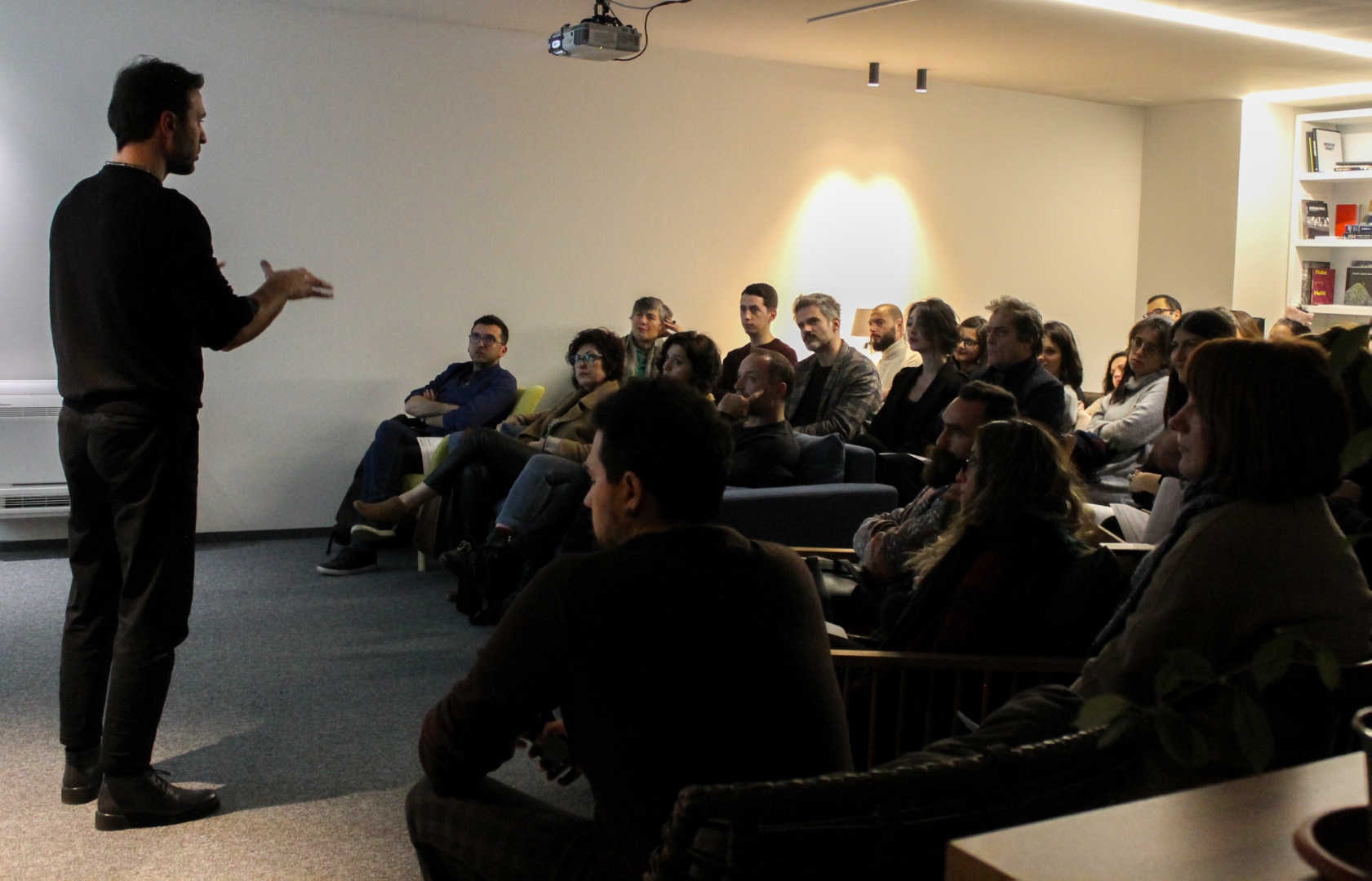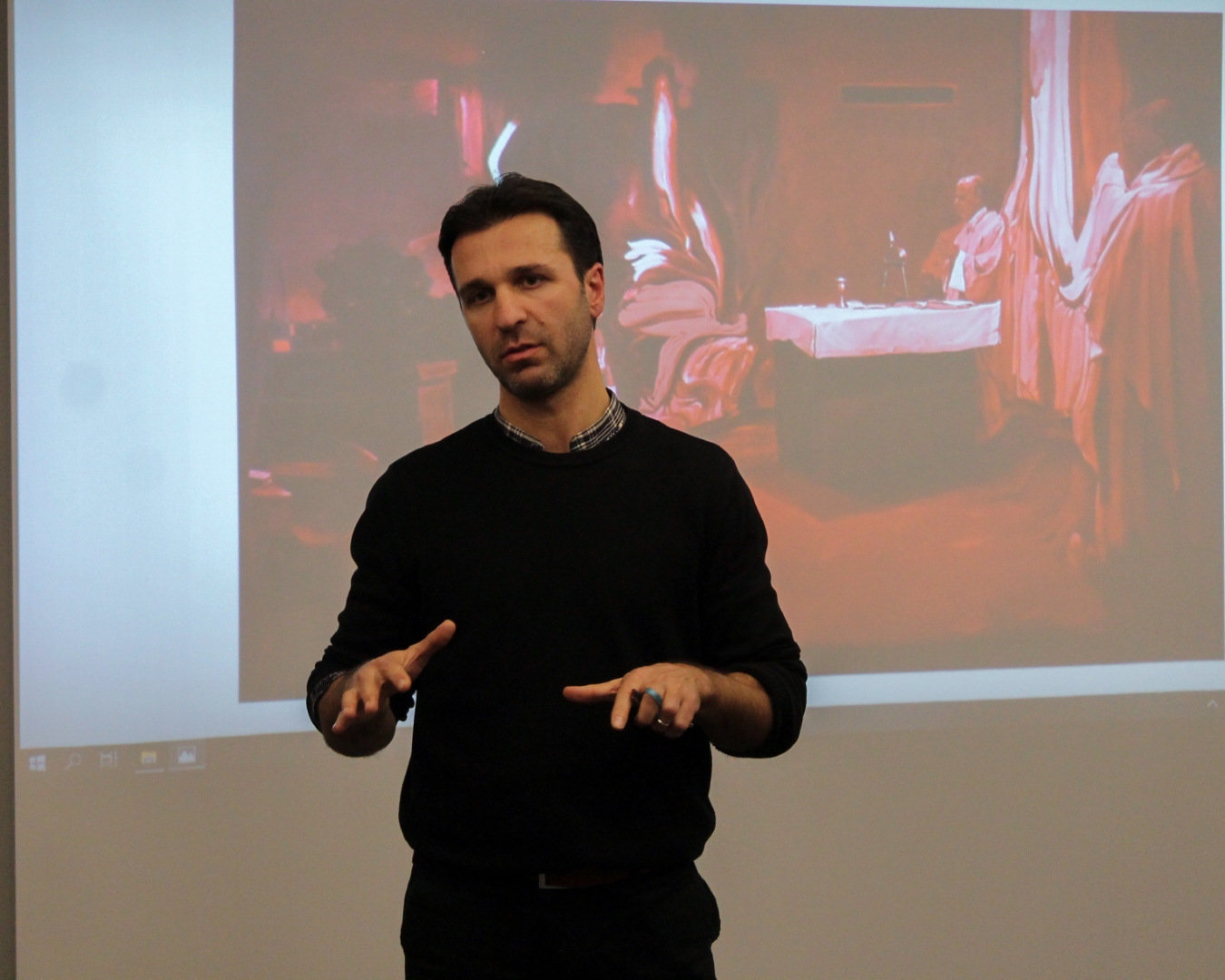Harabel Contemporary Art Platform invited artist Enkelejd Zonja for the upcoming talk on January 31st, 2020. Enkelejd Zonja spoke about his artistic journey, mentioning people and events who/which have left their mark on his life-long and professional journey. Inserting himself and his family as an integral part of some of his works, makes his creation more real, closer, more tangible, turning it into a bridge between different socio-political times, all this at times also characterized by the parodic trait present in Zonja’s creativity as a kind of innate and natural need. His work resembles not only as a connecting bridge between the past and the present, but also between artistic streams that organically intertwine within it.

He defines creative origin as a kind of accident. To him, unintentionally, a single, unconscious impulse becomes the reason to start a new creation. This impulse can be caused by a line, an object, a human, an animal, a colour, etc., which can resist or be lost in the course of painting, because the beginning and the end of a work, according to him, constitute a puzzle.
Among the provocations and cinematic influences on Enkelejd Zonja, directors Alfred Hitchcock and Andrei Tarkovsky take the lead. The first, described as the “father of tension”, the second, distinguished among other things for his dreamy visions, for his connection with nature and memory, traits which are also found in the work of Enkelejd Zonja.
The crossroads he stands and the twists and turns that an artist has to go through are so evident in the creativity of the artist in question. In his composition, it is so apparent, that each element acts as a secret word; at the same time, it enables the viewer to piece together pieces to form a complete “figure”. A “figure”, a story waiting to be unravelled by someone, a “figure”, which remains unfulfilled even for the author himself, which by no means aims its final solution, as the solution may deform the work or condition the viewers.
The crime scene is present almost everywhere, in every painting. The violence, the bloodshed is there, and it comes and hits us through its surrealistic spirit. Moreover, the crime Enkelejd Zonja is talking about is not just individual, but a reflection of a variety of causes and the prediction of a range of social consequences. Black humour and sarcasm naturally take place in all of this.
The author’s relationship with the work is constantly evolving, even when the picture is completed. The allegory used, constitutes the main feature of his work, creating a temporal and meaningful multi-layering, in support of which may come the technical uncertainty, which by some it can be read as a mistake, by another as a space to let your imagination run wild. In the end, for the artist, the artistic mosaic on Albanian reality remains the same. Only the answers are variable.
* Enkelejd Zonja was born in 1979 in Fier and lives and works in Tirana (Albania). He completed his studies at the Academy of Fine Arts in Tirana (2005-2008) and at the Royal University of Fine Arts in Stockholm (Sweden), (2008-2009). He participated in a series of joint exhibitions such as: 1207 Km East, Mucem Museum, Marseille, France (2016); “Post Albanian Artists”, “Pino Pascali” Museum, Italy (2014); “Visit in the Wound”, Zeta Gallery, Tirana, Albania 2015; “Suden” KunstHalle, Berlin, Germany (2013); “Nord Art Event”, Budelsdorf, Germany (2012); “Iron Applause”, National Gallery of Slovakia, Bratislava (2011); “A History Out of the Contect”, The Promenade Gallery, Vlora, Albania (2011); Academy Graz Gallery, Grac, Austria (2010); “Onufri”, National Gallery of Art, Tirana, Albania (2010); Albania “Rewind / Play / Forward”, Zeta gallery, Tirana, Albania (2010); “Colors of the Frontiers”, Norman Castle, Brindisi, Italy (2009); Mejan Gallery, Stockholm, Sweden (2009); “Südlicht” 18M Gallery, Berlin, Germany (2009). Enkelejd Zonja was awarded the first prize in the “Newest Idea” competition, organized by the World Bank in Albania (2007), as well as the second prize in the international competition “Onufri” in Tirana, Albania (2009). He received a three-month residency from the Tirana Institute for Contemporary Art (TICA), (2010). He is a finalist of the 2009-2010 “Arrival” award and winner of the “Villa Romana” award in Florence (2012). He also received the first prize at the LiveArt competition (2013). ARTE television dedicated a special documentary to, “Pictures of a dictatorship” / “Les images d’unedictature” (Germany / France), (2014).




